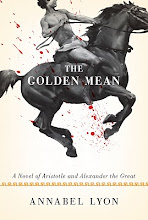Vienna, Museum of Art History, Collection of Classical Antiquities. Head of Aristotle.
Originally uploaded by sssn09
From the ocean of historical knowledge, what's known for sure about Aristotle's life would fill a thimble. Good news for this fiction writer (though some historical novelists seem to thrive on a wealth of detail - I'm thinking of Colm Toibin's The Master, inspired in no small part by Leon Edel's five-volume life of Henry James).
The bare bones are these: Aristotle was born in 384BCE in Stageira, Thrace. His father, Nicomachus, was physician to the king of Macedonia, and one can assume both from Greek custom and from Aristotle's subsequent writings that he absorbed a lot of knowledge of his father's trade. It's likely that at this time Aristotle met Philip, the future king of Macedon, then a teenager like himself. From Aristotle's will we know he had a sister and brother, Arimneste and Arimnestus. Arimneste had a son, Nicanor; Arimnestus died childless.
At seventeen, Aristotle went to Athens to study at Plato's Academy. He remained there for almost twenty years, first as a student and later as a teacher, leaving only after Plato's death.
He then spent some years in Asia Minor under the patronage of Hermias of Atarneus. In 343 or 342BCE Aristotle went to Pella, the Macedonian capital, to tutor Philip's son, Alexander. He remained in and around Pella for about seven years, until Philip's murder and Alexander's ascent to the Macedonian throne.
Aristotle then returned to Athens to head the Lyceum, a rival school to the Academy. He remained there for another twelve years or so, until Alexander's death, when Athenian sentiment turned against anyone with Macedonian connections. Aristotle then left Athens for Chalcis, which offered the protection of a Macedonian garrison. He died there a few months later.
As for Aristotle's love life, we know (again from his will) that he had a wife, Pythias, who bore him a daughter, also named Pythias. He also had a companion named Herpyllis, who bore him a son named for his father, Nicomachus. In his will, Aristotle makes affectionate provision both for Herpyllis and for the marriage of his daughter to his sister's son, Nicanor. He also provides for his many slaves. He asks that his own bones be laid with those of his dead wife, "in accordance with her own wishes".
So what's a fiction writer to make of all this? Twenty years at the Academy; another twelve at the Lyceum. Years of genius, all of them; but an explosive life of the mind can look suspiciously like a man sitting quietly in a comfortable chair, staring at his lap. Not promising material for a novel (unless you're Colm Toibin!), so I chose to focus on the seven tumultuous years Aristotle spent at the Macedonian court.
The image above is a Roman copy, mid-1st century, of a Greek original ca. 320BCE.

2 comments:
Hi Annabel - Just throwing an idea out there: what would be the chances of getting an option to write a screenplay based on the The Golden Mean?
Hi Millar,
I'd have to refer you to my agent, Denise Bukowksi (you can find her contact info at right, under Links to My Books). I'm flattered by your interest!
Post a Comment